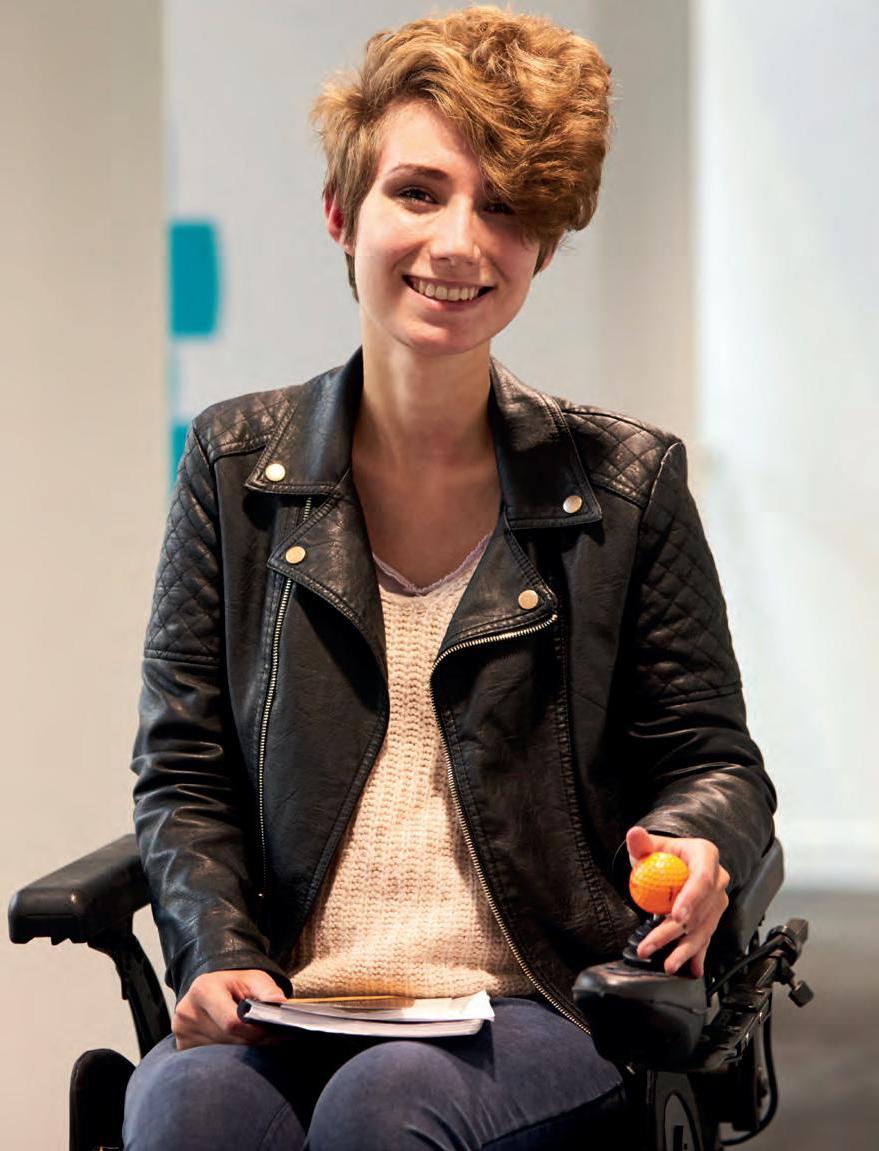
29 minute read
LIFE
LIFE INDEPENDENT LIVING
Welcome to the final section of this Guide covering everything you need to know about managing your life and making decisions for the future
It’s likely that over the next few years you will gain far more independence. Maybe you will land your first job, travel abroad alone, or even move out. You might learn to drive, have more financial power and live with other people. Managing these life events can be really tough and competing pressures can take their toll.
To navigate this exciting chapter successfully you need to start finding out what works for you. In order to stay physically and mentally healthy, you may find yoga and meditation really help you focus your mind, whereas others might find competitive sport or a hobby therapeutic. Remember that there is a wealth of information online. Whether it’s about learning to drive, careers, tips for dealing with tricky roommates
or health and wellbeing questions, it can all be found with a click of the mouse. Take some time to work out the things you and enjoy.
Remember to always ask for help and guidance if you need it. There’s no shame in asking for help whether it’s advice on your career or if you are struggling to cope. Remember, there is no problem ever too big to be resolved.
If you feel overwhelmed about your future and are unsure of what to next, remember there is no ‘right’ or ‘wrong’ decision – just do what feels best for you.
BEST APPS FOR STUDENTS
Want to harness the full power of tech to get ahead? We asked some students what apps they couldn’t live without. This is what they told us…
BEST STUDY APPS Best for… referencing EasyBib Free on Android and iOS
“This wonderful apps saves you time when to comes to the tedium of creating a bibliography. Simply search for the book or website you have used and the app will do the hard work for you.”
Best for… scanning documents Adobe Scan Free on Android and iOS
“Never buy a scanner again. This great little app lets you use your camera to scan in documents with surprising effectiveness and then e-mail, text, or save directly from the app.” Best for… making notes Evernote Free on Android and iOS
“Evernote lets you compile all of your handwritten and typed notes in one place which you can sync to all of your devices. You can use the search functionality to find specific words or phrases instead of having to trawl through everything.”
Best for… mind mapping SimpleMind Free on Android and iOS

“If you are fan of mind-mapping but want to lose the paper, this is the app for you. Simple and effective to use.” Best for… managing your time myHomework Student Planner Free on Android, iOS and Windows
“This app allows me to sync together all my lectures, tutorials and assignments in one place so I never forget anything and don’t need to carry around scraps of paper or a diary.”
BEST OF THE REST
Tracking sleep: Sleep Cycle (Free on Android and iOS)
Maps: Google Maps (Free on Android and iOS)
Planning train travel: Trainline (Free on Android and iOS)
Splitting the bill: Splitwise (Free on Android and iOS)
Managing your money: Wally (Free on iOS)
Passing your driving test: Driving Test Wiz (£4.99 on Andriod and iOS)
98 STUDENT HEALTH GUIDE SOCIAL
First of all, this is not an article encouraging you to delete your Insta, Twitter, Facebook and Snapchat profiles. Social media has it’s place in society – it’s a great tool to communicate and share information with friends and show your personality. But using these platforms does raise some questions that are worth having a think about:
How is your data being stored and used? Data privacy is a massive issue, which can’t be covered in too much depth here. In short, if you’re sharing personal information about yourself across social media platforms, are you happy with the way in which this data is being used, or do you even care? Whilst you may not think that you’re giving much away by ‘liking’


company pages or sharing posts, this gives the platform enough data to profile your personality and preferences based on what you might think are fairly innocuous actions. At worst, platforms have been accused of mining information to influence political elections. If you’re interested in learning more, there’s a huge amount of information available online to help you make an informed decision.
What are you posting?
If you post a family
LIFE
photo of yourself on holiday in Brazil, then depending on your privacy settings, you may have revealed where you are, who you’re with – and the fact that your homes are currently unoccupied. It sounds farfetched, but it’s worth thinking twice before you post. Also, remember that offensive, racist or bullying messages can be reported and may lead to action from your employer or university. Think ahead – nothing really gets deleted, so never post anything you wouldn’t be happy to see on

HOW TO CHANGE YOUR PRIVACY SETTINGS Put aside 10 minutes today and check your privacy settings. Europol have put a great guide together to show you exactly how to manage your settings on Snapchat, Facebook, Instagram and Twitter – access it at tinyurl.com/ y9rh9dl3 a billboard or by your friends, family and colleagues.
Who can see your information? Check your privacy settings – and review them regularly. The platforms have a way of sneaking in changes without you being aware. Also, check your friends list – are you actually still mates with all of these people?
If you’re always reaching for your phone or you’re desperate for likes, think how this could be affecting your health. It could be physically (are you sleeping properly or are you always glued to your screen?) or mentally (always trying to look Insta ready?). We could all benefit from putting the phone down from time to time and engaging with the here and now. IS IT AFFECTING YOUR HEALTH?
SPLIT THE COST Always buying toilet roll and never getting reimbursed? Make that a thing of the past with Splitwise – an app where you and your housemates can keep track of who bought what… and who owes what! SHOWER CADDY = KING Goodbye to the one million shampoo bottles strewn around the bathroom and hello to the caddy. Be civilised and assign one section to each housemate.

DELINEATE SPACE Depending on your housemates, this exercise could be metaphorical or literal – masking tape, anyone? If you need to, mark off the worksurfaces, the fridge or draining board to stop the arguments and finally reveal who all of the washing-up belongs to. GROUP CLEANING It’s fairer this way and many hands make light work.
MAKE FRIENDS If you love photography, go to the photography society. Greek literature? American history? Politics? Whatever it is, surround yourself with likeminded people for a sure fire way to make friends.
HACKS
ERADICATE A SPOT Got a date tomorrow and a spot has decided to show up? Put a small amount of toothpaste on it overnight to see it dramatically reduce in size.
STEAM YOUR CLOTHES No need to go out and buy and expensive steamer. Put your clothes on a hanger and hang them in the bathroom whilst you are in the shower. Voila! DOUBLE WARDROBE SPACE Loop a can ring-pull over the neck of the hanger and hang another hanger off it to literally double your wardrobe space.

MAKE A SPEAKER Put your phone in a glass or a bowl to amplify the sound. NEVER FORGET Always forget your 11 AM lecture or never know which lecture hall you’re meant to be in? Take a screenshot or photo of your schedule and save it as your phone wallpaper.
STUDENT STUDY
The very best study hacks curtesy of students who have been there and done it
While you are studying or revising, put ‘Do Not Disturb’ on your phone, write a polite note for your room door and log off social media. Put in 100% effort and you will know you have done all that you can. BLOCK ALL DISTRACTIONS GET THE MARKING CRITERIA When tutors mark assignments or dissertations, they use a marking criteria. Get a copy and have it next to you when you are writing to make sure you tick off all the required points to get the best grade.
RECORD YOUR LECTURES Use your phone to record lectures as an audio file and listen to them when you are working out or walking to uni. STRUCTURE YOUR TIME Make sure you have a plan for when you expect to study. Things will always pop up, so whilst it’s important to stay flexible with your schedule, if you keep putting off studying for parties and social events, you will never get any studying or revision done.

INVEST IN USEFUL APPS There are so many useful apps out there to make studying easier. Whether it is Cite This For Me to automatically create your citations, Grammarly to correct all of your mistakes or Evernote to manage your notes, use the tools available to you to save time and make everything that bit easier.
Not just a tool for the language students - if you copy and paste your essays into Google Translate, it will read them back to you, making it so much easier than proofreading for the 100th time and still missing something. Result! USE GOOGLE TRANSLATE USE GOOGLE SCHOLAR This search can be your best friend when writing assignments, as it searches the database of scholarly articles and takes your research one step further to a First than a simple Google search.
TYPE UP YOUR NOTES Take notes in lectures by hand and then type them up later. This gives you a second opportunity to understand and digest the information, and allows you to store them neatly on your hard drive forever.
SEARCH THE WEB FOR PRESENTATIONS OR BOOKS Type into Google ‘[Subject matter] & filetype:ppt’ or ‘[Subject matter] & filetype:pdf’ to find all of the presentations or books available on that particular subject matter.

STUDENT STUDYHACKS

If your laptop got lost, stolen or broken, the chances are you’d be more upset about the loss of your work than the device itself. Always, always, always back up to the cloud or a USB! BACK UP YOUR WORK
At uni, you’ll be the one making decisions about when, where and how your income is spent – and you’ll also be the one to deal with the consequences if you splash it all on take-aways. In order to manage your money effectively, you need to know what’s coming into your account on a regular basis.
Work out your income Depending on your circumstances, your regular income may be one or a combination of the following:
■ Student loan instalments ■ Academic bursaries, funding or support ■ Part-time job wages ■ Regular money from parents or family members

Next, grab a pen and a piece of paper. Write each month across the top and your different income streams down the left-hand margin. Jot down what you’ll receive each month. Notice that your income might be larger around September and January when you receive your student loan, but you might receive nothing, in December and June. Just remember that you’ll need to spread your income out evenly across the entire year.
It’s a really good idea to open a student account or switch to one. Banks are always incentivising students to open accounts with 0% overdrafts and railcards. Make sure you read the small print.
IF YOU’RE FALLING SHORT SOME MONTHS, YOU NEED TO BOOST YOUR INCOME OR SEEK HELP AS SOON AS POSSIBLE
Work out your expenses Now you need to think about what income you will need to cover month-to-month expenses. These may include:
■ Rent and bills (gas, electricity water, internet, etc) ■ Food and sundries ■ Travel costs, such as bus pass or car-running fees ■ Insurances and mobile phone contract ■ Books and study supplies
At the start of the academic year, you may also find it necessary to buy extra items, such as furniture, a computer, books or memberships. Make sure you factor these extras in.
The idea is that each month you have enough income to support your outgoings. Whilst you might be able to move big purchases like furniture to a more convenient month, you won’t be able to move rent, bills, food and travel costs. If you’re falling short some months, you need to boost your income or seek help.
If you do have some income left over, spread it out over the months and factor in extra treats, such as holidays, concerts, clothes, socialising and entertainment. Leave aside an amount every month for the ‘unknown’. This may be an essential book or an increase in your water bill.
Getting a part-time job If you are running short of money or don’t have enough to do the things you want, the easiest way to make more cash is to get a part-time job. Student jobs come in many shapes and sizes. When looking for a job, think about the time commitment (up to 15 hours per week for a student studying full time) and what skills it can give you for your CV (think: problem solving, team work, customer service).

Credit cards and debt Most people take out debt thinking they can repay it, but when other more urgent bills need paying – such as rent, heating or food – credit cards are usually at the back of the queue. As a student with no structured income, the best advice is to steer clear of any type of credit at all. Worst of all are payday loans due to their sky-high interest rates.
If you don’t have enough money for the basics of rent, bills and food, or you have debt worries, visit nationaldebtline.org or Student Services for support. 5 WAYS TO MANAGE YOUR MONEY Now you’ve worked out your budget, the hardest part is actually sticking to it. You might not think spending a little extra here and there is a problem, but it will soon mount up. Here are some tips on how to stick to your budget:
1Check your balance regularly to always be aware of where you’re at with your budget.
2Use a banking app so that you can check your funds on the go, or if you’re away from your main computer.
3Check your budget regularly and update it if your income or expenditure changes.
4If you struggle with bank cards because you can’t control how much you’re spending, withdraw a weekly amount in cash instead and don’t allow yourself to spend any more.
5Never turn to credit cards or payday loans to pay for the essentials – get support straight away.
106 STUDENT HEALTH GUIDE Q&A GETTING A JOB Looking for a full-time or part-time job, an internship or a work experience placement? Check out our Guide to employment here
Whilst there are some pretty obvious reasons for getting a job (money, anyone?), there are other benefits. By getting a job, you will learn new skills, develop experience for the future and meet new people. To help, we have answered your burning questions:
QHow do I get a job without having any experience? It’s tough - you need experience to get a job and a job to get experience. Having said this, a great can-do attitude and an eagerness to learn can be more attractive to an employer than prior experience. But if your lack of experience is holding you back, think about how you may be able to get experience a different way. Want a job as a chef? Volunteer at the local soup kitchen. Want to work in law? Become a legal secretary. No matter what you do, whether it’s full time, part time or on an unpaid basis, ask lots of questions and try to take on more responsibility. Whether you are flipping burgers at Burger King or working on the tills at Sainsbury’s, you are showing that you are reliable, hardworking and have customer service experience. Q How do I find vacancies? Vacancies are advertised everywhere – online, in your local newspaper or sometimes in the windows of shops or offices. Also, remember to ask around. Sometimes friends or family may know of a job coming up and can recommend you for the role. If there is something specific that you want to do, or a specific organisation that you want to work at, don’t be afraid to call or pop in to speak to the person in charge. Whilst they may not have an opening, they may jot your name down for anything that does come up.

QWhat’s the point of taking unpaid work experience placements or internships? Not many people can work for free long-term, but would you take a short-term unpaid position if you thought it would boost your career? It is a great way to establish yourself within your chosen industry and gain some relevant, practical experience that employers may ask for. It also shows that you are dedicated and willing to do what it takes to succeed. And you don’t necessarily need to wait until an unpaid opportunity is advertised – write to a local company asking if you can help out for a week or two unpaid to gain some experience.
QI am still in full-time education – how many hours should I spending working? If you want to get a part-time job, it should really be no more than 12 hours per week. Many students opt to work on a Saturday and some extra days during the holidays.
Make sure that you don’t take on too much so that your work suffers, or take an evening job that will affect your ability to concentrate during the day. Be sensible and start slow – you can always increase your hours if you want.
6 TOP TIPS FOR INTERVIEWS SUCCEEDING AT
Whether it’s for a part-time job or an internship, we all have to face an interviewer at some point in time. Here’s what you really need to know: 1 You are already through the door – Where there is the answers. Research the company, the interviewer (if 5 Calm the nerves – As much as you can, try to lots of interest in a role, getting you have their name), the role stay calm. Take a deep breath to interview is a great sign. It and the industry. before you arrive and speak means the interviewer wants to meet and find out more about you. Use this to your 3Understand the role you are applying for – Try slowly. Always shake the hand of all interviewers and give them a big smile! advantage – they wouldn’t waste their time if they didn’t think you had something to understand exactly what the role entails. Have a good look at the job advert or ask 6 Prepare some questions – There’s valuable to offer them. someone who is already doing nothing worse than having 2Research – The worst thing you can do is to go to an interview without doing the job for the inside track. 4 Stand out – An interviewer may see loads no questions at the end of an interview. Show you are engaged by preparing some ahead of time. And if they have some research. Have a think of people for a particular role – answered them during the about the type of questions how will you stand out? Maybe interview, say so! Asking them you may be asked and prepare it’s an unusual hobby, some again just because you have some responses. If you have work experience that you did prepared them will look like gaps in your knowledge, find or just a great personality. you didn’t listen.
DISABILITY Universities are extremely diverse places that offer everyone an opportunity to thrive. Here’s what you need to know to succeed
Joining university is challenging for anyone, but for students with a disability, it can be even more tricky. If you do have a disability, hopefully you made the university aware of it before you joined so they can put the necessary steps in place to ensure that you have everything you need. However, if you haven’t yet informed them, or if a disability presents itself during your course, don’t be afraid to speak up. Your university will likely have specialists who can support you with what you need. With nearly 30,000 disabled students joining UK universities each year, on-campus support is readily available. The same goes for students who have

learning difficulties or mental health conditions – speak up to get the support you deserve.

Understanding others If it is the first time that you have lived away from home, often living with others is a big learning curve. You have to negotiate people other than your family for the first time and make friends in the process. For students with a disability, it can be particularly challenging. Some disabled students can’t be instantly identified as disabled, for example if they are deaf or have a learning difficulty. Try not to judge on first impressions – there may be something you don’t instantly understand. And if you have roommates or course mates who have a disability, don’t be afraid to ask them about it and to ask what they need. Most disabled people have no problem talking about their condition – but after it’s discussed, they usually just want to be treated normally.
Studying with a disability The opportunities to achieve at university – and in life – are just as present for disabled students and they are for any other student. They key is making sure that you have all of the support you need in order to thrive and not being afraid to ask for it, and to ensure that you have a good group of friends to support you. Often it can be tougher for disabled students to make friends, so check out page 19 for some tips. If you need some support, contact Student Services who may be able to connect you with other students who feel the same.

If you know someone has a disability, watch out for them – just like you would do for any other student. If you are worried about them for any reason, have a chat with them or raise your concerns to Student Services.
TOLERANCE & FAITH Universities are home to some of the most diverse groups of people and you should never be made to feel like you can’t express yourself, or develop your beliefs, on campus.
Sitting behind every university student is a rich tapestry of beliefs, ideals and experiences. We are all completely different after all. We often grow up in a bubble and by joining university, it can sometimes be the first time that we experience people of different ethnicities, races, cultures and religions. For some, it can be the first time they have met someone quite so different, let alone study or live with them as well. This is particularly pertinent for international students who many never have lived in the UK before.
Being tolerant of others is a key skill required to navigate life. Sometimes we don’t agree with the beliefs, attitudes or lifestyles of others but we must get along in order to live a harmonious life. It doesn’t mean that you can’t express your opinions – university is the perfect place for respectful debate – but if this tips over into being aggressive or intolerant, issues can arise.

Living with others You will find that some of the people you now share accommodation with live differently to you. This is not necessarily because they are of a different nationality, race, gender or ethnicity. They could have the exact same background as you but still conduct their life differently. They may like to revise late
into the night when you prefer to party, or they might prefer Saturday nights in reading than down at the SU. Accept and embrace our differences and avoid making them feel conscious of the live choices they choose to make.
Racism and discrimination It goes without saying that racism, sexism or any other time of discrimination has no place at university, or within the wider modern society. If you are the victim of a hate crime, harassment or any other form of bullying or discrimination, have the courage to speak up and get help. Student Services, your tutor, campus security or the police are all places to turn if you need help. If you witness an incident, don’t let it go by unreported.
Faith at university Most universities, if not all, are set up to encourage you to practice your faith whilst on campus. In fact, you will find that there are many societies aligned to different faiths allowing you to meet, socialise and practice with like-minded individuals, or meet up with members to find out more about their faith. If you find that there isn’t anything like this at your university, set one up! Speak to Student Services to discuss the facilities and support they can offer you.
KEEPING SAFE
ON CAMPUS Whilst university campuses are largely safe places, it’s still important to be vigilant – especially when you’re distracted having fun. Here are our top tips
Know where the campus
Security Office is. Download a campus map and locate the Security Office. It will take two minutes, but if there’s ever an emergency, you’ll be thankful you were prepared.
Plan your routes. Wherever you are, familiarise yourself with your surroundings. When travelling by foot, always stick to well-lit areas and paths, and observe road markings and signs. If you’re studying in a city near the coast or with a river, stay extra vigilant in these areas, particularly if you’re under the influence.
Protect your stuff. Get your valuables marked by the police (usually available on campus at certain times) and keep your belongings properly insured. Remember that your work is probably more valuable to you than your computer, so always back up to an external hard drive, memory stick or the cloud.
Stay safe online. When we think ‘personal safety’, we rarely think of online dangers. But whether you’re meeting someone from Tinder, or chatting on Minecraft, remember there’s a possibility that they might not be who they say they are. Never disclose personal or financial details about yourself.

Know your exits. Whilst it’s pretty rare for there to be a fire in your halls of residence, student house or lecture hall, it’s a good idea to always be aware of your exits. And if you hear a beeping coming from a smoke detector, change the battery. It will take no more than two minutes and could be the difference between life and death.
STAYING SAFE ON A NIGHT OUT
Whether you are heading out to the SU bar or into town, be sure to:
■ Be sensible about how much you drink and never leave your glass unattended.
■ Make sure you always have enough money for a taxi home and that you only get into licenced vehicles.
■ Stay close to your mates, and make sure that you look out for them as well. If you do become separated and they aren’t answering their phone, get a cab home. Tell your mates if you plan to separate from the group.
■ Watch out for your belongings on a night out – lost phones and bank cards will double the headache the next day.
Keep your doors locked. Whether you’ve gone to use shared facilities or have popped out to check the post box, remember to always shut and lock your door. Your roommates are probably great people, but sometimes there can be visitors around that you can’t vouch for. Err on the side of caution and shut bedroom and main entrance doors to protect you and your mates.
TRAVEL CHECKLIST Whether it’s France or Fiji, prepare properly before you go to make the most of your trip

Make a plan Make sure you know where you are going, who you are going with and where you are staying. Sounds simple but ‘winging it’ could be a recipe for disaster. Do some research, read some reviews and local safety guidance and book accommodation in advance. Let your friends and family know where you are going and when you will be home.
Get your papers in order Check ahead of time that you have everything you need to visit and do the things you want to do there. For example, if you want to work abroad then you might need additional paperwork that might take a little while to get. Research ahead of time and set calendar reminders for key dates. Ensure your passport is in date – some countries need up to 6 months validity beyond your expiry date.
Get your jabs Depending on where you go, you may need vaccinations or treatment against diseases. Some countries require proof of vaccination before entering so ensure you visit somewhere reputable like a STA Travel Clinic for convenient appointments at low prices. Get travel insurance If your holiday is cancelled or you need medical assistance while you’re abroad, it could be really serious. Luckily, travel insurance is very cheap for most people and it’s so simple to get – it often takes no longer than 10 minutes and you can do it on your phone. Always check the small print to ensure you’re fully covered, especially if you’re going to be taking part of riskier activities such as skiing or bungee jumping. STA Travel offers a range of travel policies designed especially for students (visit: statravel.com).
FESTIVAL SURVIVAL TIPS Live music events are a top opportunity to hang out with mates and watch great bands. Here’s our top tips from those in the know
1Keep your mobile fully charged Forget the charger - invest in a battery powered one (and pack extra batteries) to keep your phone charged. At some point you’ll probably get separated from your mates, have to take a selfie or photo or call home so you won’t want to be without your lifeline. 2 Leave valuables at home Leave the RayBans and credit cards safely behind. Only take stuff that you don’t mind getting dirty, damaged or lost.
3Be sensible Sorry to be boring, but whilst violence at festivals is unusual, you could get injured while crowd-surfing or moshing. Move away from any rough behaviour that gives you an ‘uh-oh’ feeling. You don’t want an A&E visit ruining your day.

4Buy earplugs It seems mad to pay loads to go to a live music event just to use earplugs, but standing right next to crazy- loud speakers will hurt your ears over time. 5 Split your money ATMs are hard to find (and usually charge costly fees), so you’ll need to carry cash. Split it between your wallet and day bag, and keep both on you or within your sight at all times – never leave cash or valuables in your tent when you’re not there. Take a debit card for any emergencies. 6 Stay hydrated Pack a refillable water bottle, so you can fill up cheaply and easily throughout the day – this is especially important in hot weather.
7Keep alert Always keep your wits about you, particularly if you’re drinking. Make sure you tell your mates if you are going off.
PLANNING AHEAD – TOP SURVIVAL KIT ■ Portable phone charger ■ Water bottle Go for a Brita Plus extra batteries or something that can easily filter tap water ■ Day pack Use it to carry the stuff that won’t safely fit into ■ Toilet paper pockets Don’t go without enough – you’ve ■ Sunglasses and sun cream been warned! They’ll help protect you from the sun’s damaging UV rays At some events, organisers allow you to anonymously drop off a sample of a drug and then return a few hours later to find out what’s in it and how strong it is. If you are going to use illegal drugs, acknowledge that they will make you vulnerable. If unsure, always say no. DRUG TESTING
HAVE YOUR SAY & WIN! Scan me
1 IN 50 CHANCE OF WINNING

£50 AMAZON VOUCHER FOR EVERY 50TH RESPONSE!!! WILL YOU BE THE LUCKY ONE? Got a spare 5 minutes? Help shape the next edition of our magazine for future students. Let us know what you did and didn’t like, and we will enter you into a free draw to win a £50 Amazon voucher to spend on whatever you want. With a 1 in 50 chance of winning, it’s a no-brainer!
Terms and conditions: This free draw is run by Student Health Guide Limited. Terms and Conditions are available on request by e-mailing hello@studenthealthguide.com



